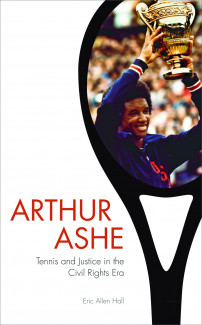
Johns Hopkins UniversityEst. 1876
America’s First Research University
Serena Williams, Arthur Ashe, and the Lesson of Forgiveness

In 2001 tennis star Serena Williams walked away from Indian Wells—and for good reason. Prior to a semifinal match with Serena, her sister Venus withdrew after experiencing tendinitis in her knee. Rumors swirled around the stadium that the match had been fixed. In the final the boos, jeers, and racial slurs rained down on Serena, Venus, and their father Richard. To the affluent white fans who filled the grandstands, wrote Grantland journalist Louisa Thomas, “the girls were too black, too loud, too different, too good, and too much of a reminder of the world that existed just beyond the margins of the desert.” Yes it was 2001, thirty-seven years after the passage of the 1964 Civil Rights Act, but tennis “was still a sport most closely identified with country club dress codes.” Years later Williams reflected that the “undercurrent of racism was painful, confusing and unfair. In a game I loved with all my heart, at one of my most cherished tournaments, I suddenly felt unwelcome, alone and afraid.” She vowed never to return.
Almost five decades earlier, Arthur Ashe had trouble even getting on a tennis court. Richmond, Virginia remained a segregated society in the 1950s, and the young phenom had the wrong color skin. Instead of competing on the tidy courts of Byrd Park, where the city’s white residents took a dip in the pool and picnicked on the lush grass, Ashe practiced at Brook Field Park, Richmond’s largest “black” recreational facility. On a number of occasions he tried to enter tournaments at Byrd Park and elsewhere in the South, but each time Jim Crow got the best of him. In 1959 the tennis chairman of the Congressional Country Club in Bethesda, Maryland claimed that Ashe sent in his registration after the deadline. Byrd Park’s tournament director Sam Woods told Ashe’s coach Ronald Charity that his protégé couldn’t play because “[t]he time’s not right yet.” When he did compete against white youths Ashe followed an unwritten code. He never talked trash, threw his racquet, argued with the umpire or his opponent, or displayed any form of emotion. He ignored when white parents called him nigger. “Blacks could not eat in restaurants [on the road],” Ashe remembered, so his team ate in the car. Ashe moved away from Richmond in the summer of 1960. “I left,” he recalled, “all that Richmond stood for at the time—its segregation, its conservatism, its parochial thinking, its slow progress toward equality, its lack of opportunity for talented black people. I had no intention then of coming back
But he did return, in 1966 when the city honored him with an “Arthur Ashe Day.” Instead of dwelling on the past, Ashe focused his speech on forgiveness and reconciliation. While praising Ashe, the Richmond News Leader criticized the city’s resolution for not grappling with Richmond’s racist history. “The resolution,” argued the paper, “probably would have meant more if it had contained at least an implied regret that while he was growing up the inherited mores of the rest of us prohibited him from playing at Byrd Park.” Like Ashe, Williams in 2015 came back to a place that had rejected her. And just as those in Richmond applauded Ashe, the crowd at Indian Wells now cheered Williams. Speaking directly to the fans she too looked to the future: “I feel that was fourteen years ago and this is now. I did the best that I could at this event, and I really am happy to have put a lot of that behind me.” Perhaps the most insightful observation of Williams’ return came from professor and author Michael Eric Dyson: “Serena’s decision to return to Indian Wells suggests the majestic arc of forgiveness in black life that has helped to redeem America. Without such forgiveness, America may have well flowed in the blood of recrimination and revenge.” Indeed.

Eric Allen Hall is an assistant professor of history at Georgia Southern University, Statesboro. His book Arthur Ashe: Tennis and Justice in the Civil Rights Era is available now.


